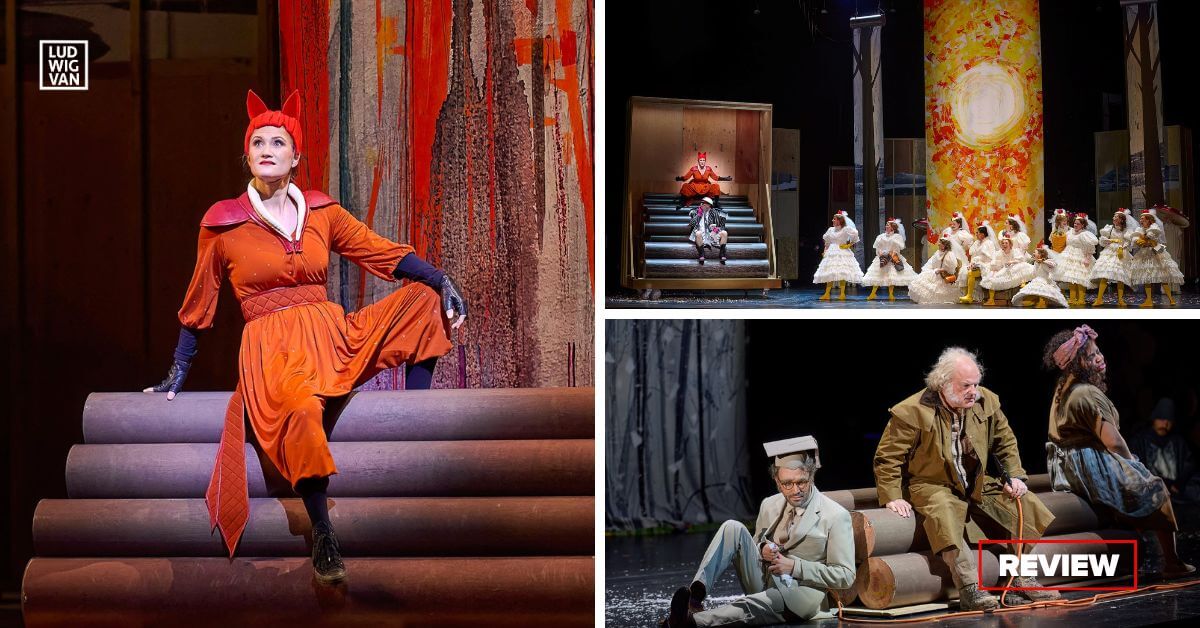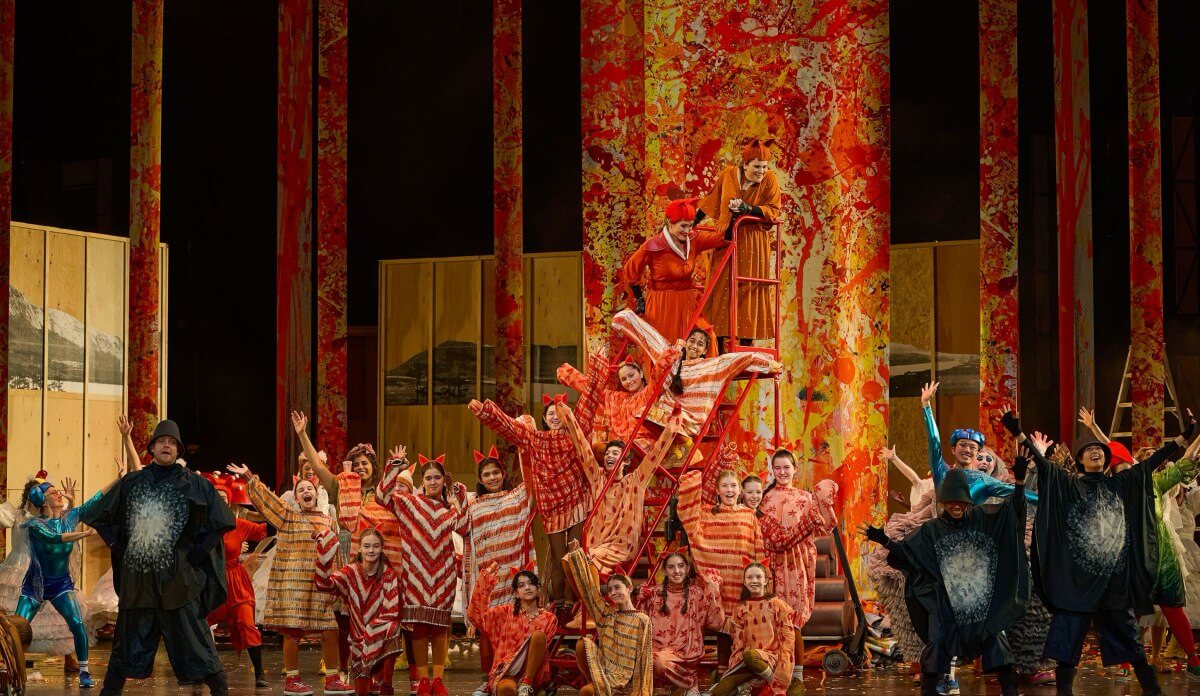
Jane Archibald (Vixen), Christopher Purves (Forester), Ema Nikolovska (Fox), Wesley Harrison (Mosquito/ Schoolmaster), Carolyn Sproule (Dog), Adam Luther (Innkeeper/Rooster), Charlotte Siegel (Hen/Innkeeper’s Wife), Giles Tomkins (Priests/Badger), Alex Halliday (Poacher), Megan Latham (Forester’s Wife/Owl), Ariane Cossette (Woodpecker/Pepik), Emma Moreau (Young Vixen), Ilana Zarankin (Jay/Frantik), Joel Glickman Rosen (Frog), Sofia Melnyk-Gomez (Grasshopper), Lee Macerollo-Korzeniowski (Cricket); Canadian Opera Company Orchestra and Chorus, Johannes Debus, conductor; Jamie Manton, director. Four Seasons Centre for the Performing Arts, January 26, 2024. Seven additional performances on January 28, February 3, 8, 10, 13, 14, 16. Tickets here.
Now that Toronto is in the dead of winter, there’s nothing quite like an opera of buoyant music and dramatic whimsy to brighten up the dreary days. The Canadian Opera Company has just the winter tonic, Janáček’s The Cunning Little Vixen, which opened on Friday at the Four Seasons Centre.
Opening night, while not quite sold out, was very well attended. There weren’t hugely demonstrative ovations during the performance of this short opera, but the audience showed its appreciation by given the performers and creative team a well-deserved big hand at the final curtain.
Of the nine operas by Janáček, Vixen is far from the most popular, certainly not at the same level as his iconic Jenufa or Katya Kabanova, and that is a shame. An enchanting staging such as the Maurice Sendak production from the New York City Opera that the COC put on in 1998 starring Rebecca Caine as the Vixen can be a truly magical evening at the opera. This time around, it’s a production from the English National Opera, directed by Jamie Manton that had its London premiere in 2022. Unlike the ENO where everything is sung in English, the COC is doing it in Czech — great for authenticity but perhaps less effective when it comes to audience comprehension.
Unlike the Sendak production that celebrates the primacy of realism, where the singers wear costumes resembling as closely as possible the animals they portray, the costuming of the ENO production is less physically convincing and more symbolic in design. The same is true for the hard-edged sets that make no attempt to depict a forest other than a surfeit of wood onstage — if anything it looks like exactly what it is, a stage! The long scrolls that drop from the top with sketchily painted scenery don’t pretend to be realistic either. I admit that it took some getting used to for literally minded yours truly.
What we do get in this production is the subtle message of the degradation of the environment by humans, as suggested by the broken scrolls that dropped completely to the stage floor, and the piles of logs signifying deforestation. The most visually pleasing aspects of this production are the costumes, colourful, whimsical, and occasionally over the top, as in the white bouffant skirts resembling bridal gowns worn by the hens. Also hilarious is the huge fluffy costume worn by the Dog, here beautifully sung and acted by soprano Carolyn Sproule.

Vixen requires a huge ensemble cast, and the artists assembled were uniformly excellent, from the principals, supporting singers, the choruses, down to the dancers and the smallest cameos. Soprano Jane Archibald was a memorable Vixen, singing with luminous tone and acting with enviable theatricality. Soprano Ema Nikolovska was a bright voiced, endearing Fox. Last heard as Alberich at the COC in 2016, British bass-baritone Christopher Purves made a welcome return as the Forester. He was wonderful on opening night, singing with firm tone and all the requisite gravitas, not to mention a particularly moving Act 3 final scene, when he wraps himself in the fallen scroll, a symbolic final embrace of the forest which made him to be what he is.
On the surface, this opera appears to be a lighthearted tale about the antics of a mischievous Vixen and the other creatures, ideal as a children’s opera. But its kernel of truth is profound — a meditation on the meaning of life and death, a philosophical musing of the passage of time. I am not embarrassed to admit that the Sendak staging of act three had me in tears 25 years ago. Now that I am a quarter century older, and the passage of time has gained even more resonance, I was expecting to be doubly moved. I am disappointed to report that this new production, with the Vixen dying offstage, plus the generally unsentimental direction, doesn’t have the same emotional impact on me.
Some musical observations. There were more wonderful performances on opening night, almost all taken by present and former COC Ensemble Studio members, too many to individually mention here. I was impressed by tenor Wesley Harrison (Mosquito/Schoolmaster) and baritone Alex Halliday (Poacher). Choral forces are vital in his opera, and the COC Chorus, plus the wonderful CCOC, were in fine form. Also very effective is the intricate choreography for the chorus and the non-singing supers. COC Music Director Johannes Debus has shown a strong affinity to the music of Janáček, and he lavished care and affection on the divine score. He held the sound down to make sure the singers were audible, but I must say the trebles were too faint, even with my front orchestra seat.
Originally inspired by a comic strip in the Brno newspaper, Janáček composed Vixen in 1923 to a libretto he adapted from a novella by Rudolf Těsnohlídek. Much of the music recalls folk tunes and rhythms of Moravia, yet very recognizably Janáček.
To my eyes and ears, the best moment of the opera is in Act 3, after the Vixen is shot and killed by the Poacher. Her death allows the story to reach its transcendent climax, one in which the Forester reflects on the inevitable pattern of nature, the cycle of life, death, and rebirth. It’s a moment that will stay with the thinking audience member long after.
Are you looking to promote an event? Have a news tip? Need to know the best events happening this weekend? Send us a note.
#LUDWIGVAN
Get the daily arts news straight to your inbox.



